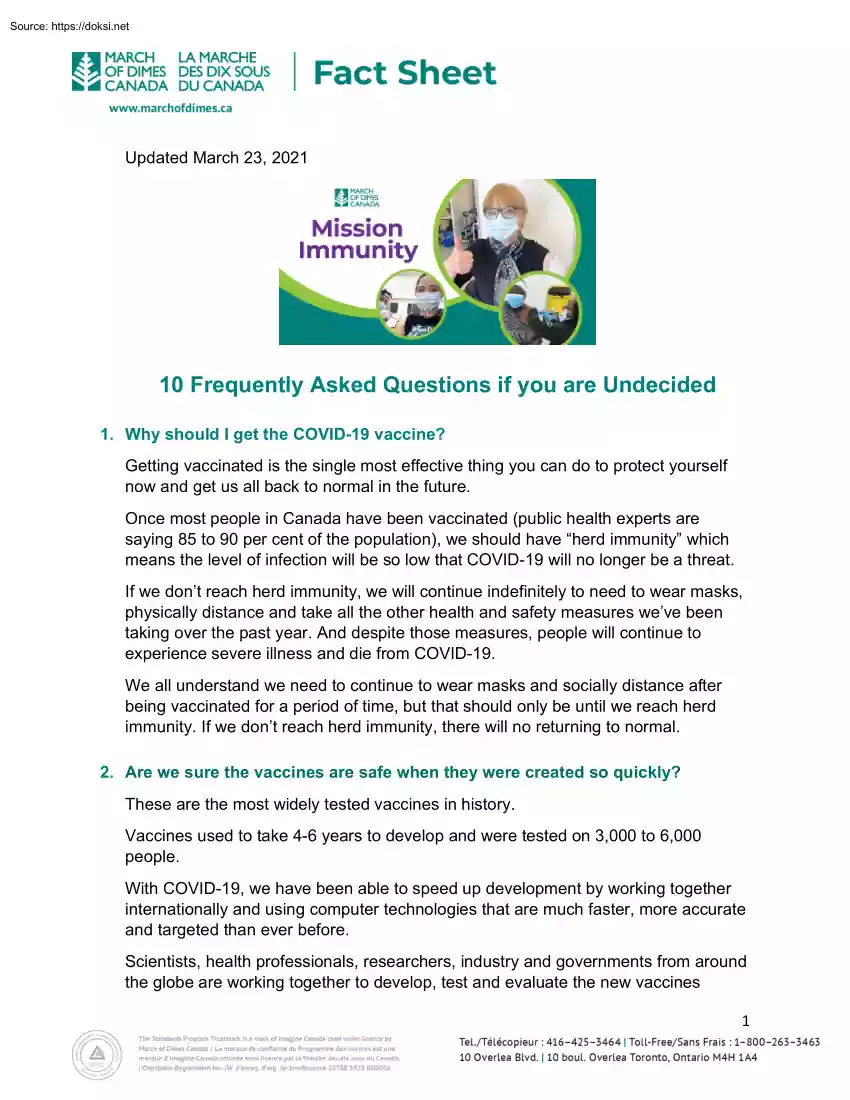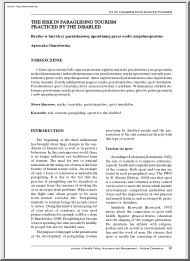Please log in to read this in our online viewer!

Please log in to read this in our online viewer!
No comments yet. You can be the first!
What did others read after this?
Content extract
Updated March 23, 2021 10 Frequently Asked Questions if you are Undecided 1. Why should I get the COVID-19 vaccine? Getting vaccinated is the single most effective thing you can do to protect yourself now and get us all back to normal in the future. Once most people in Canada have been vaccinated (public health experts are saying 85 to 90 per cent of the population), we should have “herd immunity” which means the level of infection will be so low that COVID-19 will no longer be a threat. If we don’t reach herd immunity, we will continue indefinitely to need to wear masks, physically distance and take all the other health and safety measures we’ve been taking over the past year. And despite those measures, people will continue to experience severe illness and die from COVID-19. We all understand we need to continue to wear masks and socially distance after being vaccinated for a period of time, but that should only be until we reach herd immunity. If we don’t reach herd
immunity, there will no returning to normal 2. Are we sure the vaccines are safe when they were created so quickly? These are the most widely tested vaccines in history. Vaccines used to take 4-6 years to develop and were tested on 3,000 to 6,000 people. With COVID-19, we have been able to speed up development by working together internationally and using computer technologies that are much faster, more accurate and targeted than ever before. Scientists, health professionals, researchers, industry and governments from around the globe are working together to develop, test and evaluate the new vaccines 1 24 hours a day, 7 days a week, in a way we’ve never seen before. And the amount of funding to support them is enormous in comparison to any other vaccines in history. The COVID-19 vaccines have been tested on huge numbers of people compared to trials of the past. The Pfizer vaccine, for instance, was tested on 44,000 people and has now been given to millions of people around the
world with very few side effects. According to Health Canada, the COVID-19 vaccines available here have produced no serious side effects to date in the many thousands of people who got the vaccine during clinical trials held around the world. And those people are still being monitored for any longer-term effects. No one is known to have died as a direct result of a COVID-19 vaccine. But 27 million people have died from COVID-19. 3. What if I decide not to get vaccinated? Right now, that is your right, but you should consider what you will be facing. Over time, you will be in the minority in a society that doesn’t want the risk of COVID-19 around. In your workplace, there may be tensions between the people who have been vaccinated and the people who have not. Outside of work, you will likely experience other things that will make you feel not welcome, reducing your freedom of movement and choice. For example, as more people are vaccinated, it is expected that many organizations will
require proof of vaccination to enter their premises. Israel has already implemented a program that prevents people who have not been vaccinated access to gyms, concerts and restaurants. There is also talk of countries closing their borders to the unvaccinated. The European Union is openly considering requiring a digital health pass showing proof of vaccination in order to cross borders. The media is running stories about possible phone apps that show your vaccination status being required when buying tickets for events. Airlines are considering similar requirements. The International Air Transport Association is developing a health app, the IATA Travel Pass, that will allow travelers to store verified test or vaccination results on their mobile devices. 2 4. Is there anything to learn from other countries? While Canadians might be frustrated that the rollout of vaccines here is lagging behind other countries, there are some advantages. We get to learn from their experiences. For
anyone who is nervous about getting the COVID-19 vaccine, there is a lot of comfort in that. More than 130 million COVID-19 vaccine doses have been given worldwide already. In the U.K, where the Pfizer and AstraZeneca vaccines are being used, the COVID19 infection rate appears to be decreasing substantially No one is known to have died as a direct result of any of the COVID-19 vaccines. No life-threatening side effects have been directly linked to the vaccines. 5. There are now several vaccines available in Canada How do I choose? You will probably not be given a choice. All of the vaccines are effective enough to get us to a level of herd immunity. And until we reach that point, public health experts are saying to take whatever is offered because it decreases your likelihood of severe disease and death. The Public Health Agency of Canada has released a statement saying: “the best vaccine for a Canadian is the one they can get.” 6. With variant strains becoming dominant, will the
vaccines be effective? The current vaccines are continuing to prevent severe illness and death, but there are two new things to consider because of the new variants. • • We might all need to get a booster shot or a new vaccine at some point in the future (similar to how we need a new flu vaccine each year). We will need more people vaccinated to reach herd immunity. Estimates now say we will need 85 to 90 per cent of the population to be vaccinated before we reach the point where the level of infection is so low that it no longer poses a risk. 7. I’m worried because the time between the first and second dose is being extended. I don’t think they know what they are doing Both the Pfizer and Moderna vaccines are approved by Health Canada for use as a two-dose schedule given either 21 days or 28 days apart. However, studies have been conducted – and are continuing – to look at longer spans of time between the two doses. For instance, BC’s public health officials have
proposed a delay between the first shot and the second shot to 35 days. 3 Based on data available to the National Advisory Committee on Immunization through Health Canada for both the Pfizer and Moderna vaccines, there was no difference in vaccine effectiveness between the people who got their second dose at day 19 and the people who got it at day 42. As studies around the world continue to look into this, we may see these time spans change. 8. The AstraZeneca vaccine has been pulled from the market in some European countries because of a link to blood clots. I’m afraid to get that vaccine now Countries in Europe are restarting their roll-out of the AstraZeneca vaccine after Europe's medicines regulator concluded it was "safe and effective". The European Medicines Agency (EMA) reviewed the vaccine after several European countries suspended use of the vaccine over fears of a link to blood clots. It found the jab was "not associated" with a higher risk of
clots. Health Canada has assessed the available data on the reported events and has determined that the AstraZeneca vaccine has not been associated with an increase in the overall risk of blood clots. As the vaccine roll out continues in Canada, Health Canada will continue to monitor the use of all COVID-19 vaccines closely and will examine and assess any new safety concerns. Should a safety issue be confirmed, the Department will take appropriate action. 9. The AstraZeneca vaccine was originally not considered safe for people in Canada over 64, but now the government says it is safe for people over 64. How can that be? The National Advisory Committee on Immunization (NACI) changed its guidelines on the AstraZeneca COVID-19 vaccine and is now recommending it be given to those over the age of 65 in Canada. NACI's initial recommendations were based largely on clinical trial data which was limited to people 64 and younger. It didn't include the real-world evidence that has been
gained in the U.K and other countries since the vaccine was first made publicly available. NACI has now examined the new, real-world effectiveness studies – including evidence from the U.K, which has been administering the AstraZeneca vaccine to people 65 years of age and older for months, and has updated its guidelines. 4 10. What about long-term side effects? We are not aware of any long-term side effects, but the vaccines have only been used for a year. In terms of short-term side effects, they are common, predictable and not dangerous to your health. As the vaccine roll out continues in Canada, Health Canada will continue to monitor the use of all COVID-19 vaccines closely and will examine and assess any new safety concerns. Should a safety issue be confirmed, Health Canada will take appropriate action. Experts are saying that the benefits of the vaccines outweigh the risks. • • COVID-19 has infected over 123 million people worldwide. Over 20 million active infections
exist right now. COVID-19 has caused the deaths of at least 2.7 million people so far It comes down to one plain fact: the vaccines are the only way for us to build up enough immunity so that the level of infection in our communities will be so low that COVID-19 will no longer be a threat. It is going to take almost everyone being vaccinated to get us to that point. We are all in this together and we all need to do our part. 5
immunity, there will no returning to normal 2. Are we sure the vaccines are safe when they were created so quickly? These are the most widely tested vaccines in history. Vaccines used to take 4-6 years to develop and were tested on 3,000 to 6,000 people. With COVID-19, we have been able to speed up development by working together internationally and using computer technologies that are much faster, more accurate and targeted than ever before. Scientists, health professionals, researchers, industry and governments from around the globe are working together to develop, test and evaluate the new vaccines 1 24 hours a day, 7 days a week, in a way we’ve never seen before. And the amount of funding to support them is enormous in comparison to any other vaccines in history. The COVID-19 vaccines have been tested on huge numbers of people compared to trials of the past. The Pfizer vaccine, for instance, was tested on 44,000 people and has now been given to millions of people around the
world with very few side effects. According to Health Canada, the COVID-19 vaccines available here have produced no serious side effects to date in the many thousands of people who got the vaccine during clinical trials held around the world. And those people are still being monitored for any longer-term effects. No one is known to have died as a direct result of a COVID-19 vaccine. But 27 million people have died from COVID-19. 3. What if I decide not to get vaccinated? Right now, that is your right, but you should consider what you will be facing. Over time, you will be in the minority in a society that doesn’t want the risk of COVID-19 around. In your workplace, there may be tensions between the people who have been vaccinated and the people who have not. Outside of work, you will likely experience other things that will make you feel not welcome, reducing your freedom of movement and choice. For example, as more people are vaccinated, it is expected that many organizations will
require proof of vaccination to enter their premises. Israel has already implemented a program that prevents people who have not been vaccinated access to gyms, concerts and restaurants. There is also talk of countries closing their borders to the unvaccinated. The European Union is openly considering requiring a digital health pass showing proof of vaccination in order to cross borders. The media is running stories about possible phone apps that show your vaccination status being required when buying tickets for events. Airlines are considering similar requirements. The International Air Transport Association is developing a health app, the IATA Travel Pass, that will allow travelers to store verified test or vaccination results on their mobile devices. 2 4. Is there anything to learn from other countries? While Canadians might be frustrated that the rollout of vaccines here is lagging behind other countries, there are some advantages. We get to learn from their experiences. For
anyone who is nervous about getting the COVID-19 vaccine, there is a lot of comfort in that. More than 130 million COVID-19 vaccine doses have been given worldwide already. In the U.K, where the Pfizer and AstraZeneca vaccines are being used, the COVID19 infection rate appears to be decreasing substantially No one is known to have died as a direct result of any of the COVID-19 vaccines. No life-threatening side effects have been directly linked to the vaccines. 5. There are now several vaccines available in Canada How do I choose? You will probably not be given a choice. All of the vaccines are effective enough to get us to a level of herd immunity. And until we reach that point, public health experts are saying to take whatever is offered because it decreases your likelihood of severe disease and death. The Public Health Agency of Canada has released a statement saying: “the best vaccine for a Canadian is the one they can get.” 6. With variant strains becoming dominant, will the
vaccines be effective? The current vaccines are continuing to prevent severe illness and death, but there are two new things to consider because of the new variants. • • We might all need to get a booster shot or a new vaccine at some point in the future (similar to how we need a new flu vaccine each year). We will need more people vaccinated to reach herd immunity. Estimates now say we will need 85 to 90 per cent of the population to be vaccinated before we reach the point where the level of infection is so low that it no longer poses a risk. 7. I’m worried because the time between the first and second dose is being extended. I don’t think they know what they are doing Both the Pfizer and Moderna vaccines are approved by Health Canada for use as a two-dose schedule given either 21 days or 28 days apart. However, studies have been conducted – and are continuing – to look at longer spans of time between the two doses. For instance, BC’s public health officials have
proposed a delay between the first shot and the second shot to 35 days. 3 Based on data available to the National Advisory Committee on Immunization through Health Canada for both the Pfizer and Moderna vaccines, there was no difference in vaccine effectiveness between the people who got their second dose at day 19 and the people who got it at day 42. As studies around the world continue to look into this, we may see these time spans change. 8. The AstraZeneca vaccine has been pulled from the market in some European countries because of a link to blood clots. I’m afraid to get that vaccine now Countries in Europe are restarting their roll-out of the AstraZeneca vaccine after Europe's medicines regulator concluded it was "safe and effective". The European Medicines Agency (EMA) reviewed the vaccine after several European countries suspended use of the vaccine over fears of a link to blood clots. It found the jab was "not associated" with a higher risk of
clots. Health Canada has assessed the available data on the reported events and has determined that the AstraZeneca vaccine has not been associated with an increase in the overall risk of blood clots. As the vaccine roll out continues in Canada, Health Canada will continue to monitor the use of all COVID-19 vaccines closely and will examine and assess any new safety concerns. Should a safety issue be confirmed, the Department will take appropriate action. 9. The AstraZeneca vaccine was originally not considered safe for people in Canada over 64, but now the government says it is safe for people over 64. How can that be? The National Advisory Committee on Immunization (NACI) changed its guidelines on the AstraZeneca COVID-19 vaccine and is now recommending it be given to those over the age of 65 in Canada. NACI's initial recommendations were based largely on clinical trial data which was limited to people 64 and younger. It didn't include the real-world evidence that has been
gained in the U.K and other countries since the vaccine was first made publicly available. NACI has now examined the new, real-world effectiveness studies – including evidence from the U.K, which has been administering the AstraZeneca vaccine to people 65 years of age and older for months, and has updated its guidelines. 4 10. What about long-term side effects? We are not aware of any long-term side effects, but the vaccines have only been used for a year. In terms of short-term side effects, they are common, predictable and not dangerous to your health. As the vaccine roll out continues in Canada, Health Canada will continue to monitor the use of all COVID-19 vaccines closely and will examine and assess any new safety concerns. Should a safety issue be confirmed, Health Canada will take appropriate action. Experts are saying that the benefits of the vaccines outweigh the risks. • • COVID-19 has infected over 123 million people worldwide. Over 20 million active infections
exist right now. COVID-19 has caused the deaths of at least 2.7 million people so far It comes down to one plain fact: the vaccines are the only way for us to build up enough immunity so that the level of infection in our communities will be so low that COVID-19 will no longer be a threat. It is going to take almost everyone being vaccinated to get us to that point. We are all in this together and we all need to do our part. 5




